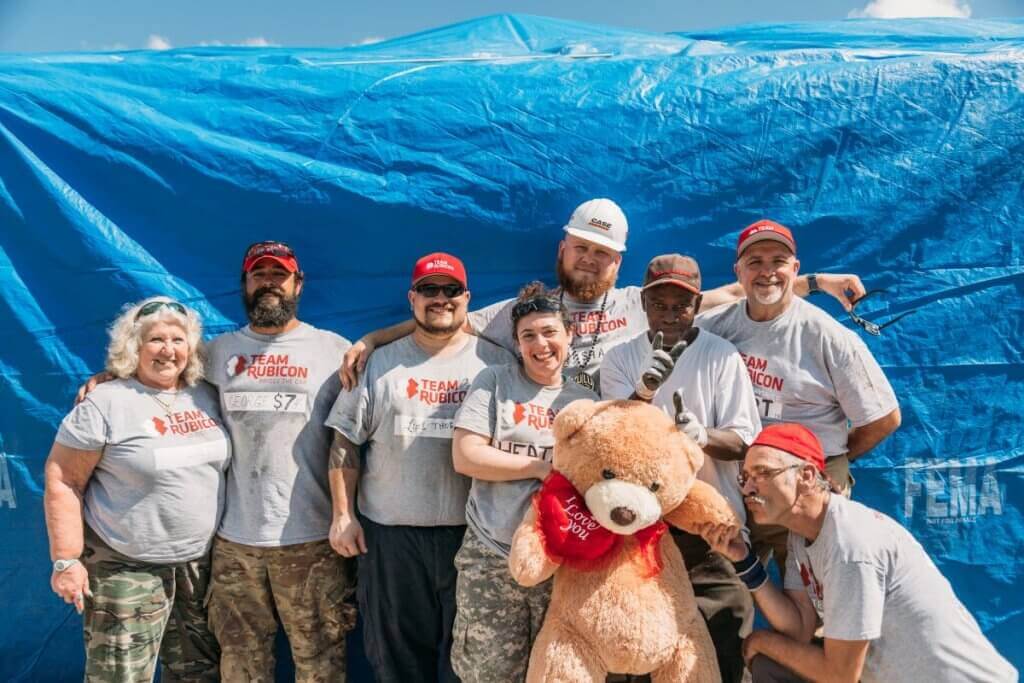This is my story of my first deployment. In it are all the tips and tricks you need to succeed on yours.
 First of all, the work was intense, not light on Operation Who Dat. We focused on debris removal and roof repair. Some crews performed internal demo, but we focused on smashing up debris.
First of all, the work was intense, not light on Operation Who Dat. We focused on debris removal and roof repair. Some crews performed internal demo, but we focused on smashing up debris.
- Every morning you start your day off by going to the FOB (forward operating base).
- When you get to the FOB, you load out your Strike Team truck for the job you’re doing that day. You also pack up water, lunch, snacks, grey shirts, gloves, glasses, etc. The Strike Teams were usually 6 people.
- After loading up, there’s a Planning Briefing and then you’re off following the daily work orders that you’ve been issued. The Strike Team Leader guides you through, using the information contained in Palantir.

One of the houses I was at for two of the five days had lost its roof. The roof had actually flown over on top of two neighboring houses. We broke down the roof by hand and then removed all of the surrounding debris. We were also tasked with tarping a bunch of roofs on neighboring houses. When we arrived, a home owner said that he didn’t think he could rebuild. By the time we were finished with everything, he said he was definitely going to be able to rebuild. He then thanked us by serving us a 5 lb bag of crawfish.
There was immediate camaraderie that formed between the TR group; especially among those who had never met before. Everyone in TR has a past and they’re all working on their own internal struggles, veteran or not. This made for a very accepting and comforting environment where people were able to share things about themselves they normally may not talk about with friends, family, or co-workers. These people understood in a different way.
Not only did the work we did impact me, but so did the Greyshirt community.
At the end of the day, everyone would head back to the FOB to clean all the gear and load up to prep for the next day’s Strike Team kit. For example, a nail gun or extra sledgehammers aren’t necessarily essential, but once you learn that you’re going to be roofing all day or sledging the crap out of misplaced roofs, you want to be sure you have the right tools.
At this operation, the logistics team brought in food and raised the beer flag after that night’s briefing. You can either hang out for a while or head back to the billets.
For our sleeping arrangements, we stayed in a church with another group of volunteers. It was a faith-based organization called Samaritan’s Purse. There were two rooms for TR members. There were cots and air mattresses – grab whatever’s open and set up shop. There’s a lot of snoring, so bring earplugs. I brought an iPad, thinking I’d watch Netflix, but the real value came from interacting with the group, so I never used it. We were out of bed at 0530 each day, so we didn’t stay up too late.

Overall, it was an incredible experience and I advise any and all of you to get involved whenever you can. I certainly caught the bug and plan to deploy whenever I’m able.
Here’s what I plan to keep in mind for next time:
- Team Rubicon’s packing list recommends bringing gloves and glasses. Those were provided on this Op. I’ll only bring one pair of each next time.
- The packing list also has water bottles and a first-aid kit. That was all provided as well, so I won’t bring those next time. I also never wore anymore than one pair of the street clothes I brought. In the future, I think one set would be enough. The laundry was done every three days, so there was no shortage of clean attire.
- Don’t bring a nice pocket knife. Bring one that you’re ok with it getting jacked up. I bought a $15 knife that had both a 1-sided blade and a razor blade. I used the razor blade every day, but not the normal one.
- Bring whatever OTC meds you think you may need (Aleve, Benadryl, Tums, etc.).
- Look, listen, and learn. There’s a ton of knowledge from the people at the Op. Some of the people I met had been on 15 or 20 different deployments. They knew how to get shit done quickly, safely, and correctly.
- Take the Core Ops class before deploying, if you can. If you can’t do that, then find someone at the Op who has completed it, or deployed.
Finally, the most important thing I can say is this: deploying was one of the best things I’ve ever done. See you out there.



